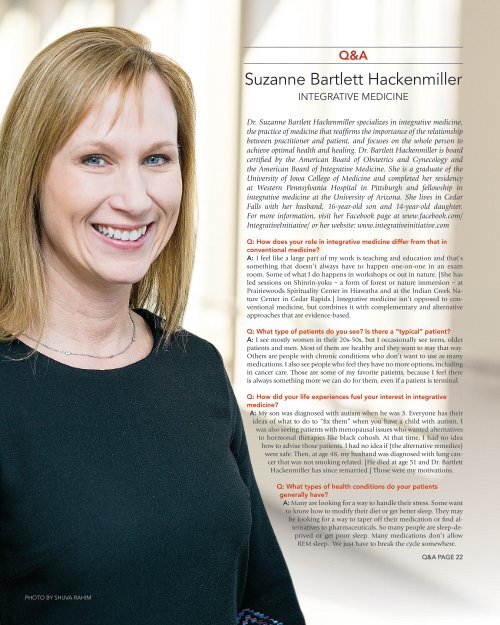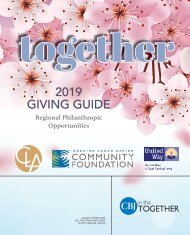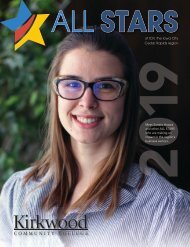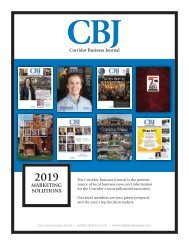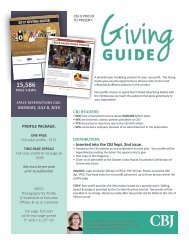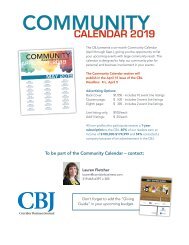BAL052217
You also want an ePaper? Increase the reach of your titles
YUMPU automatically turns print PDFs into web optimized ePapers that Google loves.
Q&A<br />
Suzanne Bartlett Hackenmiller<br />
INTEGRATIVE MEDICINE<br />
Dr. Suzanne Bartlett Hackenmiller specializes in integrative medicine,<br />
the practice of medicine that reaffirms the importance of the relationship<br />
between practitioner and patient, and focuses on the whole person to<br />
achieve optimal health and healing. Dr. Bartlett Hackenmiller is board<br />
certified by the American Board of Obstetrics and Gynecology and<br />
the American Board of Integrative Medicine. She is a graduate of the<br />
University of Iowa College of Medicine and completed her residency<br />
at Western Pennsylvania Hospital in Pittsburgh and fellowship in<br />
integrative medicine at the University of Arizona. She lives in Cedar<br />
Falls with her husband, 16-year-old son and 14-year-old daughter.<br />
For more information, visit her Facebook page at www.facebook.com/<br />
IntegrativeInitiative/ or her website: www.integrativeinitiative.com<br />
Q: How does your role in integrative medicine differ from that in<br />
conventional medicine?<br />
A: I feel like a large part of my work is teaching and education and that’s<br />
something that doesn’t always have to happen one-on-one in an exam<br />
room. Some of what I do happens in workshops or out in nature. [She has<br />
led sessions on Shinrin-yoku – a form of forest or nature immersion – at<br />
Prairiewoods Spirituality Center in Hiawatha and at the Indian Creek Nature<br />
Center in Cedar Rapids.] Integrative medicine isn’t opposed to conventional<br />
medicine, but combines it with complementary and alternative<br />
approaches that are evidence-based.<br />
Q: What type of patients do you see? Is there a “typical” patient?<br />
A: I see mostly women in their 20s-50s, but I occasionally see teens, older<br />
patients and men. Most of them are healthy and they want to stay that way.<br />
Others are people with chronic conditions who don’t want to use as many<br />
medications. I also see people who feel they have no more options, including<br />
in cancer care. Those are some of my favorite patients, because I feel there<br />
is always something more we can do for them, even if a patient is terminal.<br />
Q: How did your life experiences fuel your interest in integrative<br />
medicine?<br />
A: My son was diagnosed with autism when he was 3. Everyone has their<br />
ideas of what to do to “fix them” when you have a child with autism. I<br />
was also seeing patients with menopausal issues who wanted alternatives<br />
to hormonal therapies like black cohosh. At that time, I had no idea<br />
how to advise those patients. I had no idea if (the alternative remedies)<br />
were safe. Then, at age 48, my husband was diagnosed with lung cancer<br />
that was not smoking related. [He died at age 51 and Dr. Bartlett<br />
Hackenmiller has since remarried.] Those were my motivations.<br />
Q: What types of health conditions do your patients<br />
generally have?<br />
A: Many are looking for a way to handle their stress. Some want<br />
to know how to modify their diet or get better sleep. They may<br />
be looking for a way to taper off their medication or find alternatives<br />
to pharmaceuticals. So many people are sleep-deprived<br />
or get poor sleep. Many medications don’t allow<br />
REM sleep. We just have to break the cycle somewhere.<br />
Q&A PAGE 22<br />
PHOTO BY SHUVA RAHIM<br />
10 CBJ BALANCE - SUMMER 2017


